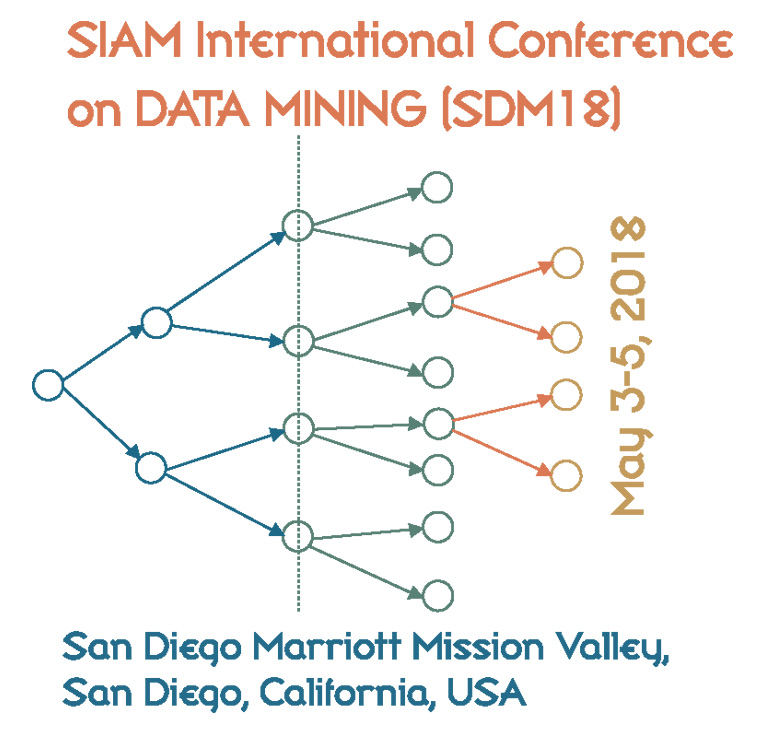BigTraffic 2018
1st International Workshop on Big Traffic Data Analytics
In conjunction with 18th SIAM International Conference on Data Mining (SDM 2018)
May 3 - 5, 2018, San Diego, California, USA
The proposed workshop (BigTraffic) aims to bring the attention of researchers to the various data mining and machine learning methods for traffic studies, and therefore promote AI research. The availability of massive amount of travel data has provided unique opportunities for data-driven intelligent transportation systems. Even though traffic patterns are extensively studied from both the marcoscopic traffic level (e.g., urban traffic patterns) and microscropic traffic level (e.g., behavior of individual drivers/vehicles), the small-scale data used in prior studies has greatly restricted the complexity of models and thus the capability of capturing complicated dynamics in traffic patterns. The availability of big traffic data has enabled a wide spectrum of powerful machine learning and data mining methodologies to be applied to traffic studies.
Topics of Interest
We encourage submissions on a variety of topics, including but not limited to:
Submission
Instructions
The workshop accepts long paper and short (demo/poster) papers. Short papers submitted to this workshop should be limited to 4 pages while long papers should be limited to 8 pages. All papers should be formatted using the SIAM SODA macro. Authors are required to submit their papers electronically in PDF format to the submission site by 11:59pm MDT, January 19 January 31, 2018.
The submission is closed.
Important Dates
- Paper Submission:
January 19, extension:January 31, 2018 - Author Notification:
February 16, 2018 - Camera Ready Paper Due:
February 23, 2018 - Workshop: May 5, 2018
Note: At least one author of each accepted paper should be registered to the conference.
Invited Speakers
 Zhenhui (Jessie) Li, Pennsylvania State University
Zhenhui (Jessie) Li, Pennsylvania State University
Title: Mining Big Traffic Data for Intelligent Transportation
(slides)
Abstract:
Large-scale traffic data can be collected from mobile phones, car navigation systems, road surveillance cameras, and loop sensors. Turning such raw data into knowledge can provide insights about our city and empower the city to be more intelligent. In this talk, I would like to share new data mining and machine learning technologies to addressing challenges in travel demand prediction, travel time estimation, and intelligent traffic signal control. In addition, I would like to share an opportunity of City Brain project, which I will soon start working on from summer 2018. This project will be in collaboration with traffic police department of Hangzhou, China. We will be exploring AI-empowered data-driven traffic signal control system. I am looking for potential collaborations on city brain project.
Bio:
Dr. Zhenhui (Jessie) Li is an Associate Professor of Information Sciences and Technology at the Pennsylvania State University. She is Haile family early career endowed professor. Prior to joining Penn State, she received her PhD degree in Computer Science from University of Illinois Urbana-Champaign in 2012, where she was a member of data mining research group. Her research has been focused on mining spatial-temporal data with applications in ecology, environment, social science, urban computing, and transportation. She is a passionate interdisciplinary researcher and has been actively collaborating with cross-domain researchers. She has received NSF CAREER award, junior faculty excellence in research, and George J. McMurtry junior faculty excellence in teaching and learning award. To learn more, please visit her homepage: https://faculty.ist.psu.edu/jessieli
 Yong Ge, University of Arizona
Yong Ge, University of Arizona
Title: Mobile Route Recommendations for Intelligent Transportation Services (slides)
Abstract:
The accumulated large amount of mobility data and the ability to track moving people or objects have enabled us to develop advanced mobile recommendations, which are essentially to recommend a sequence of locations to an individual user on the move. In this talk, we study a particular case of mobile recommendations, mobile route recommendation (MRR), by utilizing GPS data. The goal of MRR is to recommend a sequence of locations to a driver based on his current location in order to maximize his business success. To make our recommendation practical and scalable for real practice, we need to produce the recommendation results in a timely fashion once a request emerges. Therefore, we develop smart algorithms to efficiently generate recommendations. Furthermore, we identify and address the cold start challenge of MRR (CS-MRR). We develop a dedicated and efficient algorithm for the CS-MRR problem. The package of solutions for both MRR and CS-MRR problems provides a complete approach for route recommendations to drivers. We evaluate our methods using both real-world GPS data and synthetic data, and demonstrate the effectiveness and efficiency of proposed methods with different validation metrics and the improved business performance by our recommendations.
Bio:
Dr. Yong Ge is an assistant professor at University of Arizona. His research interests include data mining, machine learning and their applications. He received his Ph.D. in Information Technology from Rutgers, The State University of New Jersey in 2013, the M.S. degree in Signal and Information Processing from the University of Science and Technology of China (USTC) in 2008, and the B.E. degree in Information Engineering from Xi'an Jiao Tong University in 2005.
More invited speakers to appear!
Organizers
Organizing Committee
 Jiayu Zhou
Email is an Assistant Professor in the Department of Computer Science and Engineering at Michigan State University. He received his Ph.D. degree in computer science from Arizona State University in 2014. He has a broad research interest in large-scale machine learning and data mining, and biomedical informatics. He served as technical program committee members of premier conferences such as NIPS, ICML, and SIGKDD. Jiayu’s research is supported by National Science Foundation and Office of Naval Research. He is a recipient of National Science Foundation CAREER Award (2018). His papers received the Best Student Paper Award in 2014 IEEE International Conference on Data Mining (ICDM), the Best Student Paper Award at 2016 International Symposium on Biomedical Imaging (ISBI), and Best Paper Award at 2016 IEEE International Conference on Big Data (BigData).
Jiayu Zhou
Email is an Assistant Professor in the Department of Computer Science and Engineering at Michigan State University. He received his Ph.D. degree in computer science from Arizona State University in 2014. He has a broad research interest in large-scale machine learning and data mining, and biomedical informatics. He served as technical program committee members of premier conferences such as NIPS, ICML, and SIGKDD. Jiayu’s research is supported by National Science Foundation and Office of Naval Research. He is a recipient of National Science Foundation CAREER Award (2018). His papers received the Best Student Paper Award in 2014 IEEE International Conference on Data Mining (ICDM), the Best Student Paper Award at 2016 International Symposium on Biomedical Imaging (ISBI), and Best Paper Award at 2016 IEEE International Conference on Big Data (BigData).
 Zheng Wang
Email is a Principle Research Scientist of Didi Research. He leads the map service team of Didi research and is working on building the world leading map services, such as routing and ETA. Zheng received his Ph.D. degree from Tsinghua University in 2011. His research interests include active learning, transfer learning and low rank matrix/tensor completion and their applications in intelligent transportation and time series prediction. He won the KDD best research paper runner-up and the SocialCom best paper awards in 2013. He gave a tutorial for nonconvex sparse learning in ICDM 2015.
Zheng Wang
Email is a Principle Research Scientist of Didi Research. He leads the map service team of Didi research and is working on building the world leading map services, such as routing and ETA. Zheng received his Ph.D. degree from Tsinghua University in 2011. His research interests include active learning, transfer learning and low rank matrix/tensor completion and their applications in intelligent transportation and time series prediction. He won the KDD best research paper runner-up and the SocialCom best paper awards in 2013. He gave a tutorial for nonconvex sparse learning in ICDM 2015.
 Jieping Ye
Email is a VP of Didi Chuxing and a Didi Fellow. He is an associate professor of University of Michigan. His research interests include big data, machine learning, and data mining with applications in transportation and biomedicine. He has served as a Senior Program Committee/Area Chair/Program Committee Vice Chair of many conferences including NIPS, ICML, KDD, IJCAI, ICDM, SDM, ACML, and PAKDD. He serves as an Associate Editor of Data Mining and Knowledge Discovery, IEEE Transactions on Knowledge and Data Engineering, and IEEE Transactions on Pattern Analysis and Machine Intelligence. He won the NSF CAREER Award in 2010. His papers have been selected for the outstanding student paper at ICML in 2004, the KDD best research paper runner up in 2013, and the KDD best student paper award in 2014.
Jieping Ye
Email is a VP of Didi Chuxing and a Didi Fellow. He is an associate professor of University of Michigan. His research interests include big data, machine learning, and data mining with applications in transportation and biomedicine. He has served as a Senior Program Committee/Area Chair/Program Committee Vice Chair of many conferences including NIPS, ICML, KDD, IJCAI, ICDM, SDM, ACML, and PAKDD. He serves as an Associate Editor of Data Mining and Knowledge Discovery, IEEE Transactions on Knowledge and Data Engineering, and IEEE Transactions on Pattern Analysis and Machine Intelligence. He won the NSF CAREER Award in 2010. His papers have been selected for the outstanding student paper at ICML in 2004, the KDD best research paper runner up in 2013, and the KDD best student paper award in 2014.
Program Committee
- Zhenhui Li, Pennsylvania State University
- Shiyu Chang, IBM Research
- Yanjie Fu, Missouri University of Science and Technology
- Yong Ge, University of Arizona
- Guannan Liu, Beihang University
- Jiawei Zhang, Florida State University
- Zijun Yao, Rutgers University
- Jianpeng Xu, eBay Inc.
- Defu Lian, University of Electronic Science and Technology of China
Program
Saturday, May 5
Accepted Papers
| ID | Title and Authors |
|---|---|
| 2 | Short-term traffic volume prediction using neural networks Nassim Sohaee, Department of Information Systems, University of Texas at Dallas Hiranya Garbha Kumar, Department of Information Systems, University of Texas at Dallas Aswin Sreeram, Department of Information Systems, University of Texas at Dallas |
| 3 | Clustering Vehicles based on Trips Identified from Automatic Number Plate Recognition Camera Scans Pedro M. Pinto Silva, School of Computing, Newcastle University, United Kingdom Matthew Forshaw, School of Computing, Newcastle University, United Kingdom A. Stephen McGough, School of Computing, Newcastle University, United Kingdom |
| 4 | How Unbalanced are Bicycle Dynamics? Demand-Supply Shortage Detection with Spatiotemporal Tensor Factorization in station-less bike Systems Dakshak Keerthi Chandra, Department of Computer Science, Missouri S&T, Rolla, MO, USA Kunpeng Liu, Department of Computer Science, Missouri S&T, Rolla, MO, USA Yanjie Fu, Department of Computer Science, Missouri S&T, Rolla, MO, USA |
